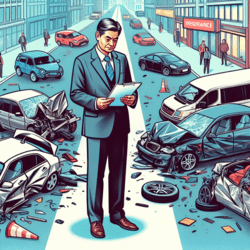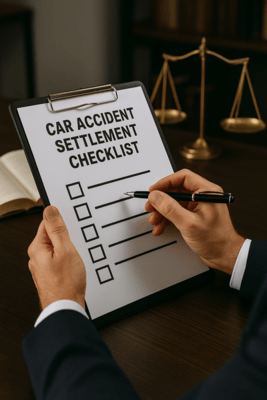Imagine this: You’re driving on a seemingly ordinary day when suddenly the unexpected happens—a collision that not only disrupts your life but sets off a perplexing, emotional, and financial roller coaster. Navigating the aftermath of a car accident settlement can be overwhelming. Whether you’re recovering from injuries or dealing with damaged property, knowing the essential steps to protect your rights and pursue fair compensation is crucial. This comprehensive guide is your go-to resource for a well-researched, SEO-optimized car accident settlement checklist that will help you rank high in your search for answers and empower you to make informed decisions.
⚡️ The Essential Role of a Car Accident Settlement Checklist

A car accident is not simply a traffic incident—it’s an event that can upend your life. In the immediate chaos following an accident, details can slip through the cracks. A detailed checklist not only helps you stay organized but also ensures you capture every piece of evidence needed to support your claim. From vital documentation to understanding insurance options, each step is crucial for building a strong settlement case.
When accidents occur, the clock starts ticking on important deadlines. Knowing what steps to take and when to take them can mean the difference between a fair settlement and a protracted legal battle. For additional insights on legal rights after an accident, consider resources such as Nolo’s legal guide and FindLaw’s accident settlement advice.
Immediate Steps After a Car Accident: Secure Your Safety and Rights
Safeguard Yourself and Others
Immediately after an accident, your top priority must be safety. First, check for injuries—yours and those around you. If anyone is hurt, call emergency services immediately. Even if injuries seem minor, it’s critical to have medical professionals assess you. Remember, some injuries may not be apparent until hours later.
Call the Authorities
Always report the accident to the police. A police report is a critical piece of evidence. It provides an unbiased account of the events and can significantly influence your case. Be sure to obtain the report number and request a copy once available.
Document the Scene
Before anyone leaves the scene, if possible and safe, document everything:
- Photographs of the vehicles and damage sustained.
- Wide-angle shots capturing the location, any road markings, or traffic signals.
- The surrounding environment which might indicate factors like poor lighting or obstructed views.
Collecting evidence right away preserves the details that might otherwise fade with time. Check out the Insurance Institute for Highway Safety for more safety tips during accidents.
Exchange Information
Exchange names, contact information, and insurance details with the involved parties. If there are witnesses, ask for their contact details as well—they could provide unbiased third-party accounts later.
Seek Medical Evaluation
Even if you feel fine, a thorough medical evaluation is necessary. Some injuries—especially internal ones—may take time to manifest. Document every medical visit, diagnosis, and treatment. This can later serve as concrete evidence of the injuries sustained.
Gathering Documentation and Evidence: Lay a Solid Foundation
Collecting Physical Evidence
For a strong settlement, gather all physical items related to the accident. Keep track of:
- Vehicle damage estimates from trusted repair shops.
- Copies of your medical records, bills, and treatment plans.
- Receipts or any proof of out-of-pocket expenses. These may include transportation, lodging if you miss work, or any other costs incurred due to the accident.
Digital Evidence and Witness Statements
Digital evidence such as time-stamped photos, videos from nearby dashboard cameras, or even smartphone footage can provide critical context about the accident. Additionally, witness statements obtained at the scene can validate your account. To understand more about the role of digital evidence in personal injury cases, visit FindLaw’s resource on evidence preparation.
Organizing Your Documentation
Once you have collected all the evidence, organize it systematically. Create a folder for all accident-related documents, and keep a detailed timeline of events. This checklist will be indispensable when it comes time to negotiate a fair settlement or if legal action becomes necessary.
Tips for Organizing:
- Use digital copies of all physical documents.
- Keep backups in cloud storage.
- Maintain a chronological order to ease reference during consultations.
The Power of a Comprehensive Medical Report
A detailed medical report not only explains the extent of your injuries but also predicts the recovery process. This report is vital in determining future medical expenses, ongoing treatments, and rehabilitation needs. Many insurance companies rely on this documentation to settle claims, so accuracy is paramount. For deeper insight into what a comprehensive medical report should include, review guidelines on Nolo’s website.
Understanding Liability & Insurance: The Complex World Behind Every Claim
Determining Fault in a Car Accident
Accidents are rarely black and white when it comes to determining fault. Many factors, such as road conditions, driver error, and even defective vehicle parts, might contribute. Often, multiple parties may share liability. In cases of comparative negligence, even if you are partially at fault, you might still be entitled to compensation—albeit reduced.
Understanding the concept of comparative negligence can be challenging, but it’s key to your settlement success. Learn more about these legal standards by exploring detailed articles on FindLaw’s comparative negligence section.
The Role of Insurance Companies
Insurance companies are in the business of minimizing payouts. They often scrutinize every detail of your accident, sometimes even exploiting small errors in your documentation to reduce your compensation. An effective settlement strategy requires you to understand the claims process, the terminology, and how insurance adjusters evaluate cases.
With this knowledge at hand, you’re better prepared to counter any aggressive tactics. For a primer on dealing with insurance companies, consult resources offered by the National Association of Insurance Commissioners (NAIC).
Navigating Multiple Insurance Claims
In scenarios where multiple vehicles are involved or accidents occur at intersections, determining which insurance policy should pay can be confusing. Sometimes, your own insurance policy might cover the damages under a “no-fault” clause, further complicating the landscape. It is critical to understand which coverage applies and how that can affect your settlement.
Negotiating with Insurance Companies: Stand Your Ground and Negotiate Smartly
Preparing a Settlement Demand
Before entering negotiations, it’s essential to develop a detailed settlement demand package. This package should include:
- A comprehensive narrative of the accident
- Detailed records of all medical treatments and repairs
- Evidence of lost wages or other financial impacts
- Future treatment costs or anticipated repairs
A well-prepared package leaves little room for the insurance company to undervalue your claim. For guidance on drafting a compelling settlement demand, check out Nolo’s settlement negotiation tips.
Key Strategies in Negotiation
Negotiating with insurance adjusters requires a blend of patience, persistence, and expertise. Here are some strategies:
- Remain calm and stick to factual accounts.
- Avoid admitting fault at any stage.
- Present your documentation confidently.
- Be prepared to justify every incurred expense with evidence.
The Importance of Professional Negotiation
In many cases, hiring a seasoned attorney specializing in personal injury claims can dramatically impact the outcome. Legal experts can not only interpret the intricacies of insurance policies but also ensure that any settlement offer reflects the true extent of your damages. To research local personal injury attorneys, reputable sources like Avvo can be extremely helpful.
Timing Your Negotiations
Timing is critical. Insurers might initiate settlement discussions relatively early in the process, but you should not rush to accept the first offer. Allow your investigation to conclude fully and discuss your options with your attorney. Delaying can ensure that all future costs and complications are factored into the settlement amount.
Evaluating a Settlement Offer: Know Your Worth
What Constitutes a Fair Settlement?
A fair settlement should cover all losses incurred from the accident, including:
- Immediate costs: emergency medical bills, car repairs, and towing fees.
- Long-term impacts: ongoing medical treatments, physical therapy, and rehabilitation.
- Non-economic damages: pain and suffering, emotional distress, and diminished quality of life.
When reviewing settlement offers, calculate both current and anticipated future losses. Use online settlement calculators such as those available on Nolo as a starting point.
Analyzing Insurance Adjuster Offers
Insurance companies often present an initial offer as a starting point for negotiations. These offers are usually significantly lower than what you might be entitled to. Comparing the initial offer against the documented damages and future expenses can provide a clear picture of whether the compensation is adequate.
The Role of Expert Opinions
In some cases, obtaining an independent evaluation from medical experts or auto repair specialists can bolster your claim. Expert opinions add credibility to your documented costs and often help in negotiating a higher settlement. Look into services offered by organizations like the American Medical Association (AMA) for expert referrals.
When to Consider Legal Action
If negotiations with the insurance company stall or you believe that the settlement offer is unjust, legal intervention might be necessary. Filing a lawsuit could be the best course of action to seek full compensation, even though it might prolong the process. Weigh the pros and cons carefully, and consider professional legal advice to decide your next steps.
Legal Considerations & Professional Assistance: Empower Your Case with Expert Guidance
Understanding Your Legal Rights
It’s crucial to be fully aware of your legal rights following an accident. In many states, specific statutes govern the timeframe within which you can file a personal injury lawsuit. An experienced personal injury lawyer can help you understand the intricacies of these laws and ensure that you do not miss any critical deadlines. Visit resources like FindLaw’s personal injury law section for an in-depth overview of your rights.
When to Engage a Personal Injury Attorney
While pursuing a settlement on your own is theoretically possible, the nuances of insurance claims and legal procedures may necessitate professional legal support. Consider hiring a personal injury attorney if:
- The accident resulted in severe injuries or long-term disability.
- There are complex liability issues or multiple parties involved.
- The insurance company’s settlement offer is far below the documented damages.
A qualified attorney not only supports your case with expert negotiation skills but also helps navigate the intricate legal landscape to secure fair compensation. Platforms like Avvo can assist you in finding a reputable lawyer near you.
Preparing for Litigation
While many settlements are reached without the need for court intervention, being prepared for litigation strengthens your negotiation position. Your attorney will compile all evidence, consultations, and documented damages to build a robust case. Understanding that litigation might be a contingency measure if negotiations break down can help set realistic expectations.
The Impact of Local Laws
Car accident settlement laws vary greatly by state. What might be a standard procedure in one jurisdiction can differ in another. This is why localized legal consultation is paramount. Familiarize yourself with state-specific guidelines and regulations using resources like the National Conference of State Legislatures (NCSL).
Your Ultimate Car Accident Settlement Checklist: A Step-by-Step Guide
Below is the ultimate checklist to ensure you don’t miss any key steps in your car accident settlement process:
- Immediate Safety Measures:
- Check for injuries and secure medical help.
- Alert emergency services and obtain medical evaluations.
- Documentation and Evidence Collection:
- Photograph the accident scene and damaged vehicles.
- Gather witness information and police reports.
- Collect all medical records, bills, and receipts.
- Understanding Liability:
- Determine fault based on police reports and witness statements.
- Understand the impact of comparative negligence.
- Dealing with Insurance:
- Exchange insurance and contact information with the other party.
- Prepare a detailed settlement demand package with all evidence.
- Research your rights and understand common insurance strategies.
- Negotiation Tactics:
- Do not rush; wait for a complete assessment of your damages.
- Negotiate firmly, supported by evidence and expert opinions.
- Consider the benefits of hiring a personal injury attorney.
- Evaluating Settlement Offers:
- Assess if the offer compensates for both current and future damages.
- Use expert evaluations for undisputed legitimacy.
- Know when to escalate to legal action if settlement discussions stall.
- Legal Guidance:
- Consult a reputable personal injury attorney for expert advice.
- Make sure all documentation complies with local legal requirements.
- Remain aware of state-specific timelines and regulations.
- Follow-Up Procedures:
- Continue to document your recovery process.
- Retain receipts and medical records for future claims.
- Keep in regular contact with your attorney if litigation becomes necessary.
Staying Proactive: Continuous Monitoring and Future Preparedness
After settling an accident claim, your journey does not end immediately. Continuous monitoring of your recovery and any changes in your condition is crucial. Sometimes unforeseen complications, such as delayed onset of pain or emerging medical issues, can require additional compensation.
Future Medical Expenses and Rehabilitation
Even if you’ve settled a claim, keep track of any further treatments or rehabilitation needs. A settlement that appears to cover your current medical bills might fall short of future expenses. Creating an updated medical report every few months is recommended to ensure your case remains accurately documented for any subsequent legal adjustments.
Long-Term Financial Planning
An unexpected accident can leave lasting financial impacts. Beyond the immediate medical bills and repair costs, consider how lost wages, decreased ability to work, or ongoing care expenses might affect your future. Consult financial advisors who specialize in loss mitigation and long-term compensation planning. For further insights, visit trusted sources like Investopedia’s guide on financial recovery after accidents.
Periodic Reassessment with Your Attorney
Your attorney’s role can extend beyond just finalizing the settlement. Periodically reassess your case with legal counsel to determine if additional legal actions might be necessary as your recovery progresses. This proactive approach ensures that any long-term claims can be revisited if additional evidence surfaces.
Leveraging Support Networks
Beyond the legal and medical arenas, lean on support from community networks. Support groups, both online and offline, can offer shared experiences and additional resources. Organizations such as Mayo Clinic’s patient support resources can provide valuable advice and a community of survivors navigating similar challenges.
Wrapping Up: Empowerment through a Well-Structured Settlement Process
Navigating the storm of a car accident settlement is never easy. However, with the right checklist, attention to detail, and timely legal counsel, you can turn a seemingly insurmountable challenge into a manageable process. From immediate safety measures and thorough documentation, through the complex realm of insurance negotiations and legal rights, this guide has equipped you with the knowledge to secure a fair and comprehensive settlement.
Being proactive, knowledgeable, and well-prepared not only boosts your confidence during these challenging times but also significantly increases the likelihood of receiving the compensation you deserve. Remember, in the world of car accident settlements, every documented detail counts.
For further reading and to keep yourself informed about recent changes in accident settlement laws and insurance policies, regularly visit authoritative sites such as FindLaw, Nolo, and the National Association of Insurance Commissioners.
Take Charge: Your Next Steps to a Successful Settlement
- Revisit this checklist periodically as you compile documentation and gather evidence.
- Engage professional legal assistance early in the process to ensure a strong claim.
- Stay informed about evolving settlement laws by following reputable legal and insurance-related websites.
- Most importantly, don’t let frustration or the stress of the process keep you from advocating for your rights.
Every step, from the moment of the accident to the final resolution, contributes to the strength of your overall case. Being thorough today can signal a smoother path to recovery—and a fairer settlement—tomorrow.
By following this ultimate car accident settlement checklist, you’re better prepared to navigate the complexities of fault, negotiation, and legal claims. Armed with knowledge and a well-organized strategy, you can confidently move past the chaos of an accident and secure the compensation that truly reflects the damages you’ve endured. Let this guide be your constant companion throughout the entire process, ensuring that every key step is met with the precision and care that you deserve.
Remember, empowerment comes through informed action. If you ever feel overwhelmed, take a moment to review the detailed steps outlined here, consult with trusted professionals, and proceed one measured step at a time. Protect your rights, safeguard your future, and let this checklist guide you to the justice you deserve.
In conclusion, dealing with a car accident settlement is an intricate process requiring careful planning, thorough documentation, and timely professional advice. Whether it’s ensuring immediate safety, gathering and organizing evidence, or preparing to negotiate with insurance companies, each step is essential to building a strong and defensible claim. Use this comprehensive checklist as your roadmap to a successful settlement journey.
For more detailed, specialized advice and additional reading, consider exploring resources such as the American Bar Association and Mayo Clinic for health and legal support. By staying proactive and informed, you can ensure that every nuance of your case is adequately addressed, paving the way for a fair and just resolution.
Embrace every step with confidence—knowing that your diligence now will secure a better, more stable future in the aftermath of an accident.
References
- Nolo. (n.d.). Car Accident Legal Guide. Retrieved from https://www.nolo.com/legal-encyclopedia/car-accidents
- FindLaw. (n.d.). Accident & Injury Law Resources. Retrieved from https://www.findlaw.com/injury/accident-injury-law
- Insurance Institute for Highway Safety. (n.d.). Safety Research & Data. Retrieved from https://www.iihs.org
- National Association of Insurance Commissioners. (n.d.). Consumer Information. Retrieved from https://www.naic.org
- Investopedia. (n.d.). Financial Recovery After Accidents. Retrieved from https://www.investopedia.com
- Mayo Clinic. (n.d.). Patient Support Resources. Retrieved from https://www.mayoclinic.org
Stay safe, stay informed, and remember: your rights matter, and every detail counts in securing the settlement you deserve.

